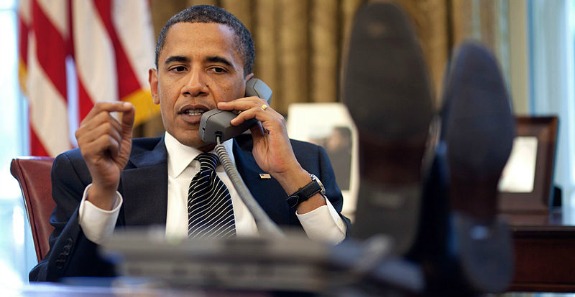The Obama administration and its war on whistleblowers

CRACKING DOWN: In a recent blog post, the AP’s Washington Bureau Chief lists eight ways the Obama administration is blocking information.
By Andrew Collins | Watchdog.org
You know things are getting pretty bad for press freedom when even establishment media bastions like the New York Times are complaining about it.
In one poignant incident last spring, for instance, Times reporter James Risen made himself inescapably clear when he said the White House is “the greatest enemy of press freedom that we have encountered in at least a generation.”
Risen, who had been fighting — and recently lost — a court battle to protect a confidential source from being forcibly revealed, clearly had foreign policy and national defense in mind. However, the problem is not limited to matters of security. Risen’s case is only one example among many of the Obama administration’s ramped-up campaign against whistleblowers across America.
In a recent blog post, Associated Press Washington Bureau Chief Sally Buzbee listed eight ways that the Obama administration is blocking information, which in turn are hampering efforts by reporters to find the data and sources needed to hold the government accountable.
“Day-to-day intimidation of sources is chilling,” Buzbee writes in one of her points. “AP’s transportation reporter’s sources say that if they are caught talking to her, they will be fired. Even if they just give her facts, about safety, for example. Government press officials say their orders are to squelch anything controversial or that makes the administration look bad.”
Buzbee goes on to note that the Freedom of Information Act is “under siege.” Agencies are slow to respond to requests — often so slow that news agencies requesting important documents for their investigations have been forced to sue to force action. Even more chilling, the administration routinely forwards FOIA requests to political appointees so it can discover and track what news organizations are pursuing.
Buzbee’s last point — that the administration is intervening in the affairs of state and local officials to control which information they release — mirrors a recent Watchdog.org report that found a similar troubling trend.
In that story, Watchdog.org reporter Kenric Ward cited former agency employees like Robert MacLean, an air marshal for the Transportation Security Administration, and Robert Van Boven, a doctor from a Veterans Affairs facility in Texas. MacLean said that managers at the TSA “thumb their nose” at whistleblower protection laws, and Van Boven said he found the bureaucratic culture “fights transparency and degrades whistleblowers.”
On one hand, whistleblowing is on the rise, according to Carolyn Lerner, chief attorney in the U.S. Office of Special Counsel. Yet it is also targeted more fiercely than ever. Out of last year’s 2,900 cases, 1,400 involved retaliation against whistleblowers, who lost more than three-quarters of the time.
The problem is not one or two cases centered in Washington, it seems, but is systemic nationwide. Van Boven, for example, was a medical doctor in Texas who was fired after alleging “fraudulent billing and ghost employees who didn’t help one single veteran.”
Tom Devine, legal director for the Government Accountability Project, says the crackdown is made possible as more agencies exploit and expand a “sensitive jobs loophole” to keep government employees from speaking out about waste, fraud and abuse. Such “sensitive jobs” aren’t just held by the likes of NSA leaker Edward Snowden anymore. They can include employees in roles as innocuous as stocking sunglasses at military base exchanges.
Ward notes that the Obama administration has paid lip service to this problem by “enhancing” the 1989 Whistleblower Protection Act in 2012. But contrary to President Obama’s claim that he has overseen the “most transparent administration in history,” news reports have trumpeted “Obama’s war on whistleblowers.”
Such dire circumstances only highlight the importance of a robust, free press that asserts its First Amendment rights in the dark corners of government.
“Beware the government that loves secrecy too much,” warned AP president Gary Pruitt last year after the Department of Justice was found to have secretly probed thousands of AP reporters’ calls.







